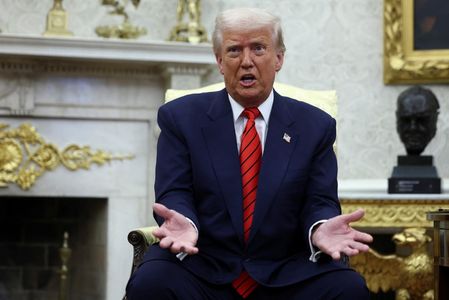The government shutdown has been averted and has led to division within the Democratic Party. The panel discusses the split and the struggle to find ways to challenge Trump.
Clip: Democrats split on shutdown bill and struggle to challenge Trump
Mar. 14, 2025 AT 8:54 p.m. EDT
TRANSCRIPT
Notice: Transcripts are machine and human generated and lightly edited for accuracy. They may contain errors.
Jeffrey Goldberg: Good evening and welcome to Washington Week. If you asked me two months ago who I thought Donald Trump would be fighting with come March, I would definitely not have answered Canada, Panama, or Denmark, because that would make no sense. But it is March, and Trump is threatening the sovereignty of all three countries, countries that are notable because, until January, they were our friends and allies.
I want to talk about this and about Trump's apparent sympathy for Russia tonight with Laura Barron-Lopez, the White House correspondent for the PBS NewsHour. Stephen Hayes is the editor of the Dispatch. And David Sanger is a White House and National Security Correspondent for the New York Times.
Thank you all for joining me. We've got a lot to talk about.
Laura, you're going to explain the averted shutdown, just averted this evening. Many Democrats think that Chuck Schumer, Democratic leader, capitulated to Donald Trump. Can you explain what happened and what the fault lines here are within the Democratic Party?
Laura Barron-Lopez, White House Correspondent, PBS NewsHour: Yes. So, Congress averted a shutdown until September or through September and Minority Leader Chuck Schumer essentially said that he felt like Democrats would take the blame if they voted against the government funding bill, that he didn't want to exert more pain on federal workers. And so he rallied enough votes essentially to support this bill that Democrats had no part in shaping or forming.
Republicans control all of government. They did it without Democrats and essentially said, you either vote for it or you don't. And, yes, so many House Democrats are really upset with Schumer because they feel as though he kind of left them out to dry, that there were a number of Democrats in Trump-won districts who voted against this bill. And they wish that they had been told previously, oh, maybe Senate Democrats are going to end up supporting and providing the votes for this, because they felt as though it was a betrayal. I mean, that's what you're hearing from people like Alexandria Ocasio-Cortez, who is really launching this campaign against Schumer, saying that they feel as though that the Democratic Party leadership is not up to the task.
Jeffrey Goldberg: Steve, the Democrats not a unified or very effective opposition at this point.
Steve Hayes, Editor, The Dispatch: Not at all. I mean, they've been very quiet. They're trying to figure out what the heck to say. They don't know what to say at this point. And I think that's part of the challenge that Chuck Schumer faced. I think he made a number of mistakes getting to this point by not, you know, giving some cover to these vulnerable House Democrats, by not, you know, coming up with an actual plan that they could follow. He was, as recently as yesterday, offering a different solution and then he sort of capitulated.
I think the real problem is they didn't have much leverage. And, strategically, what does this get them? What would they have gotten had they not done what Chuck Schumer did? And I don't think that's clear.
FROM THIS EPISODE


Clip: Trump's unpredictability with allies and adversaries


Full Episode: Washington Week with The Atlantic full episode, 3/14/25

© 1996 - 2026 WETA. All Rights Reserved.
PBS is a 501(c)(3) not-for-profit organization
